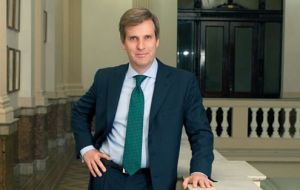MercoPress. South Atlantic News Agency
Mrs. Kirchner gets her way and will pay debts with Central bank reserves
 Martin Redrado lost the institutional battle
Martin Redrado lost the institutional battle Argentine President Cristina Fernandez de Kirchner and her cabinet signed Thursday a disputed decree removing Central Bank President Martin Redrado from office amid a fight over the use of bank reserves to pay debt due this year.
The five-article decree cited Redrado for “misconduct” and “non-compliance” in carrying out his duties as a public official. It calls for the suspension of procedures outlined in the Central bank’s charter that require the president to consult a special committee set up by congress.
Opposition lawmakers and former central bank presidents including Alfonso Prat-Gay said Mrs. Kirchner doesn’t have the authority to dismiss Redrado, who is due to complete a six-year term in September.
“This is completely illegal and doesn’t have any judicial validity” said Federico Pinedo, an opposition lawmaker. “We will fight in the courts to have this annulled; it is Congress that votes for the Central Bank president and it’s Congress that sacks him”.
Under the bank’s charter, Central Bank Vice President Miguel Pesce will take over as interim head of the institution. Pesce, a graduate of the University of Buenos Aires, served as a finance secretary of the city of Buenos Aires, according to his official Web page at the central bank.
The decree signed by President Cristina Kirchner and 14 cabinet members also orders legal proceedings to be brought against Redrado. It says Redrado’s failure to carry out an order to set aside 6.6 billion US dollars in reserves, under the denomination of Bicentennial Fund, to pay debt this year the reserves had created “a kind of anarchy.”
The government’s debt plan “was not just a mere order from the executive branch, but the use of an exceptional tool” that the central bank is required to carry out, according to the decree.
Pesce insisted that “even though the bank is an independent institution, it is not autonomous from the National Constitution”. He added “I believe that respecting institutional order is essential to economic stability”. Pesce also referred to the emergency decree that created the Bicentennial Fund. He said that it “ought to be obeyed.” The decree was filed in order to pay the debt the country is facing in 2010.
The dispute between Redrado and the government is making Argentina less attractive to investors, economists and former bank presidents said.
“If it goes on too long, this will really generate problems and bring a lot of extra risk factors into the equation for bondholders” former Finance Secretary Daniel Marx said in an interview on Thursday. “The government has lost its compass again.”
Cabinet Chief Anibal Fernandez and Economy Minister Amado Boudou called for Redrado to step down on Wednesday saying he had failed to support the government’s economic policies, including the planned use of central bank reserves.
Mrs. Kirchner has offered Redrado’s job to a former central bank president and renowned economist Mario Blejer who originally had considered the job but declined once he was aware of the magnitude of the institutional dispute.
The Argentine government is planning to return to international markets this year for the first time since defaulting on 95 billion USD of debt in 2001 by settling claims with creditors.
Argentina which is South America’s second-biggest economy used 10 billion USD in reserves to pay off the International Monetary Fund in early 2006. Central bank reserves rose to 48 billion USD on January 6 from as little as 8.2 billion in January 2003, the Central bank pointed out in an e-mailed statement on Wednesday.
Prat-Gay and former central bank President Javier Gonzalez Fraga said Redrado, who almost tripled reserves to 48 billion since taking office in September 2004, was right to refuse Mrs. Kirchner’s request.
“There is a legitimate debate over what the optimal levels of reserves are but this isn’t the way to resolve it,” Gonzalez Fraga said on Todo Noticias television. “The cost of trying to do things this way is much higher than any benefit it would bring”.
Redrado, who studied economics at the University of Buenos Aires and public administration at Harvard University, was president of Argentina’s securities regulator, known as CNV, from 1991 to 1994. He was fired from the commission by then- President Carlos Menem after criticizing a government plan for pensioners to sell shares they had been granted in oil company YPF SA.




Top Comments
Disclaimer & comment rules-

-

-

Read all commentsFinally doing the right thing instead of the “popular” thing.
Jan 08th, 2010 - 03:21 pm 0Bubba, is not the “popular” is the DEMOCRATIC thing
Jan 08th, 2010 - 10:34 pm 02010, an interesting year in Argentina.
Jan 09th, 2010 - 02:16 am 0Commenting for this story is now closed.
If you have a Facebook account, become a fan and comment on our Facebook Page!